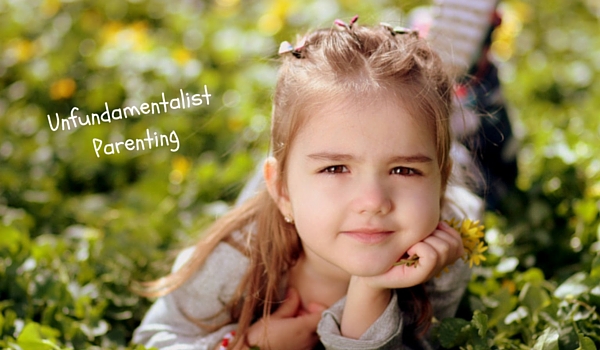I have this question but I don’t have a good answer. What about the Bible? What about faith? What do I teach my child when I fall into that category known as “progressive Christian” but I don’t fit there neatly? I don’t know how to tell my daughter what I believe when she’s old enough to start asking. I want to say,
“No religion has it all right. We who are called to faith, to religion, to the spiritual–we’re trying to connect with the divine. We’re all doing our best, and we come to it in different ways, through different sources. My practice includes Jesus, because that’s who I knew when I was a child, and that’s who I seek now.”
This is where I am right now. But I remember that certainty I had as a child, as a teenager, before the first cracks appeared in my shiny, seemingly unshakeable faith. I wouldn’t welcome that certainty now, because the world’s too complicated for it, but sometimes I miss how easy it all seemed. And then I don’t know what to tell my child.
I can’t tell her stories from the Bible while teaching her that they are literally true. I remember being told that and not learning until I was much older just how complicated a collection of books it is. I took it literally because I was a child, and that’s often how young children understand stories. It’s hard to see the over-arching metaphors and the mythologizing when you’re taught to take everything the book has to say at face value because sola Scriptura (I was raised Lutheran). But I no longer take the Bible literally.
I can’t tell my daughter that the Creator God from the first chapter of Genesis made the world, said it was good, then angrily punished two people (and because of them, all of us) for breaking a single rule. I can’t tell her that that same God then destroyed the entire world with a flood except for a handful of people and animals on a boat. I can’t tell her that the nation of Israelite marched into Canaan and slaughtered people wholesale at the word of a warlike God. And I’m not sure what I can say about the gospels and their inconsistencies and my love for the book of John, which is beautifully crafted but perhaps the least “factual.”

And what about the things I love about this book of ours, those moments that are complex and beautiful? Can I tell her one time I read the story of the leper in Mark, the one who came to Jesus and asked to be made clean if he was willing, I cried? Because I suddenly realized that was likely the first time that man had been touched in years? Can I tell her the first chapter of John sends chills down my spine with the words, “And the word became flesh and dwelt among us?” Do I tell her (when she’s older) that the first time I read a chapter out of Song of Solomon, I was struck by the beauty of the language and the image of the woman’s body drawn by the passionate words? Do I tell her of the nights I spent in anxious terror as a child, poring over the Psalms, desperate for some kind of comfort that would ease my fears?
Because I love this book of ours, this Bible, this Holy Book that has been the Word of God to so many over the centuries. I love it and yet it causes me pain at the same time. This book I love has been used to deny the fullness of the Imago Dei in women, in people of colour, in queer people. I’ve wondered what to do with all the passages on women and submission, and how to respond to the “clobber” verses when sometimes even well-thought-out support for gay Christians leaves bisexual people like me still out in the cold. I’ve wept over the genocidal passages in Joshua that were used as an excuse to destroy the aboriginal peoples of North America. I nearly vomited the first time I heard the story of Abraham sacrificing Isaac after I became a parent.
I don’t know how to talk to my child about the Bible, this text we read every week at church. The Old Testament reading, the Psalm sung or read together, the New Testament reading, and the Gospel reading where the book is carried into the centre of the church where we gather round to hear these holy words. The rhythm of the liturgy carries us through to the Eucharist and I watch my daughter hold out her hands to receive the bread, the body of Christ. She comes as a child, imperfect in understanding, yet part of the Church that embraces us.
She isn’t asking those questions yet. She’s not yet three, and more focused on asking me for more cereal in the morning. I know the questions are coming soon. “Why do we go to church? Who is Jesus? What does this story mean?”
I can only hope the answers will come out of my imperfect understanding, my flickering faith, and my hope that the Spirit will speak through me and give me the answers she needs to hear.
Anna L. Olson is a parent, writer, and linguistics nerd who blogs at Epenthetical. She is a sometimes agnostic Anglican who loves the church even when it makes her want to bang her head against the wall.












